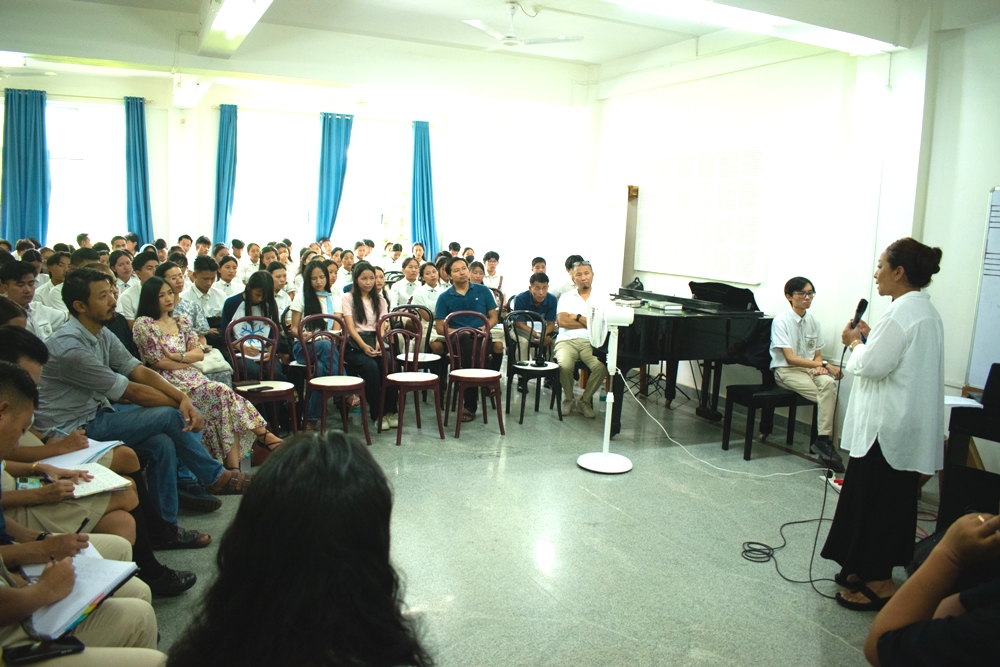SUNDAY, NOVEMBER 23, 2025
- Home
- Patkai Christian College holds interactive dialogue on Naga ancestral remains
Patkai Christian College holds interactive dialogue on Naga ancestral remains
Patkai Christian College organises interactive dialogue on ‘Understanding the process of repatriating Naga ancestral remains.’
Share

DIMAPUR — The Department of History, Patkai Christian College (autonomous) organised an interactive dialogue on ‘Understanding the process of repatriating Naga ancestral remains’ on September 12 at MSSM building.
The interaction was organised to learn and understand the ongoing process of repatriating Naga ancestral human remains from Pitt Rivers Museum (PRM), University of Oxford, from members of the Forum for Naga Reconciliation (FNR) and the Recover Restore and Decolonise (RRaD), the college stated in a press release.
The FNR-RRaD team included Rev. Dr. Ellen Konyak Jamir, Coordinator of RRaD, Nepuni Piku, Dr. Aküm Longchari and Sopie Joel Rungsung.
Rev. Jamir emphasised three key points: repatriation should be a collective initiative of the Nagas as a whole, rather than an individual or institutional effort; repatriation goes beyond the physical return of remains, prompting Nagas to re-examine their history and identity through the lens of dignity; and the process involves reclaiming and honouring the dignity of the Nagas' past, redefining their identity and historical narrative.
The repatriation journey, she argued, has spurred the Nagas to act as a people, rising above divisions in order to reclaim what rightfully belongs to them.
Also read: Naga leaders reflect on Pitt Rivers Museum visit, urge repatriation of ancestors’ remains
Additionally, she highlighted repatriation as a process towards healing and reconciliation. Stressing the importance of addressing intergenerational trauma, Dr. Jamir urged the need to understand the ways in which contemporary challenges may mirror long histories of unresolved or unaddressed pain and suffering.
Piku reflected on ‘Nagas yesterday, today, and tomorrow,’ tracing the community's history from pre-colonial to post-colonial times. He emphasised the need for deeper engagement with concepts like human dignity, self-determination and indigenous peoples.
He contrasted these ideals with the current status of Nagas as scheduled tribes, highlighting the distinction between their historical identity and the imposed categorisation post-Indian independence.
During the decolonisation period, non-state nations and peoples like the Nagas were excluded from the rights-forming process, including the right to self-determination. This was largely due to the lack of international legal recognition beyond the modern state system, which prioritised the interests of member states within the United Nations framework, he said.
However, the post-decolonisation period saw growing recognition of indigenous peoples' rights through key international instruments, including the ILO Convention 107 (1957), ILO Convention 169 (1989), and UNDRIP (2007).
This evolution in rights recognition highlighted the historical denial of the Naga nation-state's sovereignty, leading to misrepresentation and objectification of their identity, commodification of their culture, looting of cultural wealth, and exploitation of resources, Piku added.
Dr. Longchari posed a poignant question: What happens to a people when their memories are erased and their past is inaccessible? He emphasised that colonial knowledge production and violence against Indigenous knowledge were key tools of colonial domination.
Citing the ‘Rhodes must fall’ movement, he noted that museums are contested spaces of power, but also potential sites for redress, justice, and healing.
He also emphasised that repatriation is a decolonisation process, empowering Nagas to reclaim their history and culture. Dr. Longchari highlighted the interdisciplinary and multi-layered nature of repatriation, characterised by community-led dialogue, informed consent and inclusive approach.
Further, viewing repatriation as a journey, not a destination, he maintained that it's a continuous, consensus-driven process rooted in the community's voices.
The three speakers also answered questions from the audience in an engaging Q&A session.
The rapporteurs for the event were Kili Kiba, Lily Shohe, Vitsumong, and Aben Kikon, all 5th semester students in the History department.
It was informed that the History department has also introduced a new course titled ‘Decolonisation, repatriation, and reconciliation’, a multi-disciplinary course that was framed by its faculties and is currently being offered in the 3rd semester.
The session was chaired by Dr. Thejalhoukho Casavi, a faculty at the History Department.

